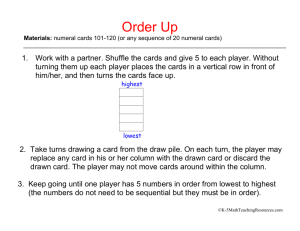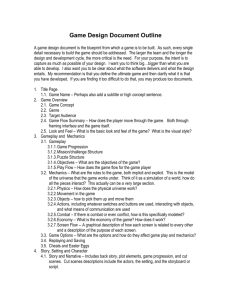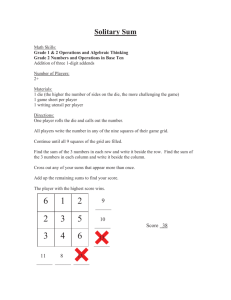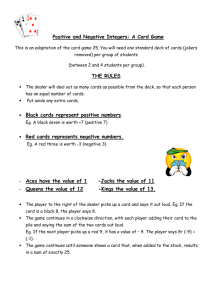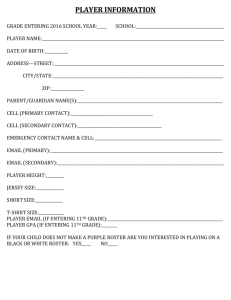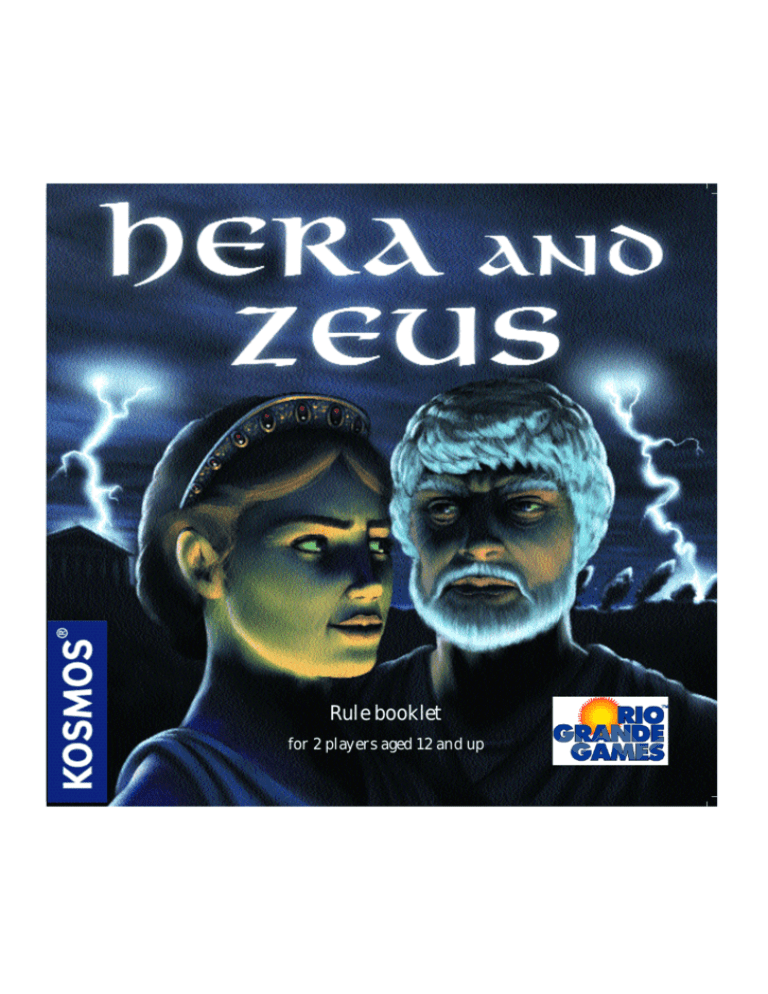
Rule booklet
for 2 players aged 12 and up
When Gods feud,the earth quakes!
• Each player takes the figure of his God or Goddess
and places it on his side of the table.Each player
takes the summary card for his God or Goddess.
The summary cards brief ly describe the special
powers of the cards and how often each occurs in
the deck.
Zeus,the father of Gods,and his wife Hera often
disagreed on matters both earthly and olympic.
Eventually, the disagreement became a full-fledged
feud with both Zeus and Hera calling upon the other
Gods from Olympus and mortals from earth to
support him or her against the other. Cyclops,
Amazon,Medusa,Hydra, Pegasus,and others joined
the feud.Both have taken a hostage (Hera has Io and
Zeus has Argus). The players take the roles of Hera
and Zeus and use strategy and cunning to pit their
allies against the allies of the other to rescue the
hostages.It is winner take all for rescue of the
hostages and control of Olympus!
• Each player thoroughly shuffles his card deck face
down and takes the topmost 9 cards as his starting
hand,which is kept hidden from his opponent.The
players place the remaining cards in their decks
face down next to their God or Goddess figure.
If a player draws one of the hostage cards (Argus or
Io) as one of his first 9 cards, he shows the card to
his opponent, draws another card to replace it, and
shuffles the hostage card back into his deck.
goal
Hera wins,when she finds Argus and liberates him.
Zeus wins,when he finds Io and liberates her.
the cards
• Each player has a deck of 43 cards.
contents
86 cards (each player has a deck of 43 cards)
1 Zeus figure
1 Hera figure
2 summary cards
Fury
• Most of the cards have a number
from 0 to 7 in the upper right and
left corners.The number is the
strength of the card in a challenge.
The higher the number, the
stronger the card.These cards are
played face down when first played
in the game.
preparation
• The players sit opposite each other.
• Some cards have mythological
symbols below the numbers.
These cards have special powers
that are explained later and on the
summary cards.
• One player takes the
role and cards of Hera
(violet) and the other
player takes the role
and cards of Zeus
(green).
2
Amazon
• A few cards have the mythological
symbol only in the upper left and
right corners,but no numbers.These
cards are never played on the table,
but are played for the special power
they have and then discarded.These
special powers are explained later
and on the summary cards.
The playing field looks like this:
Dionysus
4th row
3rd row
the playing field
2nd row
• Each player chooses 3 cards from his hand and
places them on the table face down next to each
other as his first row.
1st row
Zeus’
discard
pile
• During the game,the players will add other cards to
the playing field.Each player may add up to 3 more
rows of 1,2,or 3 cards each.These rows are played
behind the first row.
Hera’s
discard
pile
• Thus,behind each card in the first row, a player may
place 1,2,or 3 cards. The card in the first row and
the cards behind form a column. A column can
have 1,2,3,or 4 cards.
1st row
2nd row
• Therefore,a player may have at most four rows and
three columns on his side of the playing field.
3rd row
4th row
columns
3
1. Draw one card costs one action point.The
player takes the topmost card from his card deck and
adds it to his hand.A player may have at most twelve
cards in his hand.When a player has exhausted his
card deck,he may no longer use this action.
playing the game
The players alternate turns starting with the starting
player.The starting player is the player who was most
recently in a Greek restaurant. If neither player has
ever visited a Greek restaurant,Hera begins.
2. Play a card on the playing field costs one
action point.The player always plays the new card
face down on his side of the playing field.
On a player’s turn,he has as many action points to
use as he has columns at the beginning of his turn.
This will be 1,2,or 3, except when a player has the
Hera or Zeus figure in play.When a player has one of
these figures in play, he gets 4 action points.
For example, if a player starts his turn with 2
columns, he has 2 action points to use.
The player may play the card in front,behind,or
between cards in a column on the playing field.If a
player wants to play a card where another card lies,
he moves that card,and other cards behind it,
backwards (towards himself) to make room for the
new card.After a new card is played,the cards in the
column must all be next to each other with no empty
spaces.
A player may take the following actions for the cost
of 1 action point each:
1.draw one card,
2.play a card on the playing field,
3. challenge an opponent’s card,or
4.play a Mythology card.
A player need not fill in a row with three cards before
starting a new row. Similarly, a player need not fill a
column before placing cards in another column.
A player may not voluntarily remove one of his cards
from the playing field.Therefore,a player must
carefully plan each of his moves.
A player may take any specific action as often as he
has action points to spend.The actions can be taken
in any order.
For example, a player may (with 3 action points)
draw a card, challenge an opponent’s card, and
then draw another card.
As indicated above,a player may move a card by
placing a new card.Also,playing Dionysus allows a
player to rearrange cards within a column or
columns.
A player must spend all action points he is allowed.
He cannot save them for later or refuse to use them.
Remember: Each player’s side of the playing field
may have only 4 rows and 3 columns.
Note: If a player begins his turn with no cards on his
side of the playing field,he loses the game (see
Ending the Game and the Winner)!
A player may look at his face down cards at any time.
4
3. Challenge an opponent’s card costs one
• The player who initiates the challenge,slides the
challenging card forward (toward the challenged
card),turns the card face up (if it was face down),
and announces the strength of the card.His
opponent turns the challenged card face up (if it
was face down) and announces its strength.The
card with the higher strength wins the challenge.
The losing player puts the defeated card face up on
his discard pile.The winning card remains face up in
the first row and may challenge again in this round.
action point.
Players may only use challenges beginning with
their second turns in the game.
4. Play a Mythology card costs one action point.
The player places the card in his discard pile after
using its power.
the challenge
• When the two cards have equal strength,both are
discarded by the players.
• When the opposing columns from the two
opponents both have cards,a challenge is possible.
A player may not challenge an opponent’s card
diagonally.
• When a card loses a challenge and is discarded,the
player moves the cards in that column forward to
fill the empty space.
• A player is not obligated to initiate a challenge
unless no other action is possible.
Note:players may not use the challenge action
during the first round.
Mythological Actions
Some cards have mythological powers (indicated by
the mythological symbols) in addition to their
strength and other cards have only mythological
powers.The mythological powers of the cards ar e
explained below.
• Only cards in the players’ first rows may challenge
(except Pegasus) or be challenged.Io,Argus,
Medusa,and Pandora may never initiate a challenge.
Hera’s 1st row
Hera
Zeus
Hera and Zeus
When played, Hera or Zeus
enters the playing field.
These are the possible
challenges
• In the turn that Hera or Zeus is played,the player
gets four action points to spend, regardless of the
number of columns he has on the playing field. If
the card is played after the player has used one or
more action points, he does not get four more,but
treats his turn as though he had four to start with.
Zeus’1st row
5
Medusa
Medusa
Medusa may only be defeated in a
challenge by Hero or Amazon.
• When any card, except Hero or
Amazon, challenges Medusa,the card
loses the challenge and is discarded.Medusa
remains face up on the playing field.
• The player pays no action points to play the card.
• The card is discarded when
played.Then,the player
places his Hera or Zeus figure
in his 1st row, replacing the
card there.The player then
moves all the cards in that column,including the
card in the 1st row, back one space.If a column has
4 cards,the Hera or Zeus figure may not be placed
in that column.If all 3 columns have 4 cards,the
player may not play the card.The Hera or Zeus
figure may not be played in an empty column.
• When Hero or Amazon challenge Medusa,she loses
and is discarded.The Hero or Amazon card remains
face up on the playing field.
• Medusa is a strong passive card.Medusa can never
initiate a challenge.
• Once a figure has been placed,the player may not
move his figure, even with Dionysus.However, he
may remove his figure as one of his actions.Neither
player may initiate a challenge,including a Pegasus
from his hand,in a column that has a figure in it.
Pandora
Pandora
Pandora, with her famous box, is a very
dangerous card – for both the player and
his opponent.
• When any card challenges Pandora, all
cards in that column are lost and discarded.Each
player determines the order in which the cards are
placed on his discard pile.
If Io or Argus is in the affected column, the player
who loses Io or Argus loses the game (see Ending
the Game and the Winner).
• To remove the Hera or Zeus figure from an
opponent’s 1st row, a player must challenge the
figure with a Pegasus card from his hand.When a
player does this,he immediately discards the
Pegasus card and his opponent removes the Hera or
Zeus figure from the playing field.The figure
remains on the player’s side of the table as it may
be used again.
• When a player challenges a card in his opponent’s
hand with Pegasus and selects Pandora,the
opponent loses all cards from his hand and places
them on his discard pile in the order he wants.
If Io or Argus is in the opponent’s hand, the
opponent loses (see Ending the Game and the
Winner).
The opponent then moves the cards that were
behind the Hera or Zeus figure forward in the
column to fill the empty space.
• As long as a player has his Hera or Zeus figure in his
1st row, he gets four action points to use per turn,
regardless of the number of columns he has.
• Pandora can never initiate a challenge.
6
Pegasus
In a challenge, Pegasus has a strength of
only 1. Pegasus’ real value to a player is
that of a scout.
immediately discards the Pegasus card.The
opponent turns the challenged card face up if it is
face down.If the challenged card has a strength of
0 or 1,it is discarded;otherwise the card remains
face up.If the player uses Pegasus to challenge the
opponent’s Hera or Zeus figure,the opponent
removes the figure immediately.
Note: for a single action point, a player can use
Pegasus to force his opponent to turn over a card
in his first row.
or
3. Pegasus played to the player’s playing field
A player can play Pegasus face down on his side
of the playing field like any other strength card.
As the card is face down, the player’s opponent
will not know what it is and may believe it to be
a stronger card.If it is in the player’s 1st row, he
may use it in a normal challenge.Once Pegasus
is on the playing field, it cannot use its special
mythological powers.
Pegasus
Pegasus may be used in several ways:
1. Pegasus challenges an opponent’s hand card
For one action point,a player may use Pegasus to
challenge a card in his opponent’s hand.The player
immediately discards the Pegasus card and selects
one card randomly from his opponent’s hand.
• If the selected card is Io or Argus,the game ends
and the player who played the Pegasus card is the
winner (see Ending the Game and the Winner)!
Note:thus, it is not advisable for a player to hold
Io or Argus in his hand for long.
• If the selected card has a mythological symbol on it
(except Amazon or Hero),he places the card on his
opponent’s discard pile.
Pythia
Pythia can spy on an opponent’s cards
and is the only card that is stronger than
Nemesis and Poseidon.
• If the selected card has a strength of 2 to 7,he
places the card face up in his opponent’s 1st row
in the column of his choice.He may not place the
card in a column with 4 cards or in a column with
the Hera or Zeus figure in the 1st row. If there is no
row where the card may be placed,he places it on
his opponent’s discard pile.
or
2. Pegasus challenges an opponent’s card or
figure in the 1st row
For one action point,a player may use Pegasus to
challenge an opponent’s card or the Hera or Zeus
figure in the opponent’s 1st row.The player
Pythia
Pythia may be used in several ways:
1. Spy into opponent’s hand
For one action point, a player may use Pythia to force
an opponent to show him all the cards in his hand.
The player immediately discards the Pythia card.If
Pythia finds Poseidon or Nemesis in his opponent’s
hand,his opponent must immediately discard the
Poseidon or Nemesis card.
7
hand and may play it on this turn or a subsequent
turn as if it were his own card.The player
immediately discards the Sirens card.If the topmost
card in the opponent’s discard pile is not a card of
strength 1-7,a player may not play Sirens.
Note:as the back sides of the cards are different, the
opponent may easily identify “his”card in the
player’s hand.
If Pythia finds Io, Argus, or Pandora, nothing
happens, but the player may use that
information to his advantage.
or
2. Challenge Poseidon or Nemesis
Pythia can be used to challenge an opponent’s
card.As for any challenge,Pythia must be in the
player’s 1st row and challenge the opponent’s card
opposite her. When Pythia challenges Poseidon or
Nemesis,Pythia wins and the opponent must
discard the Poseidon or Nemesis card. When Pythia
challenges or is challenged by a card other than
Poseidon or Nemesis, the normal challenge result
occurs. If Poseidon or Nemesis challenge Pythia,
Pythia loses and is discarded.
or
3. Turn over cards in an opponent’s column
For one action point,a player can use Pythia to
turn over all face down cards on his opponent’s
side in one column.The player who played Pythia
chooses which column his opponent must turn
over.The player immediately discards the Pythia
card.
Note:using Pythia to turn over the opponent’s
cards does not cause any effect if Pandora, Io,
Argus, Nemesis, or Poseidon are among the
turned over cards.
Hades
Hades
A player may use Hades to take back a
card from his discard pile.
For one action point,a player may use
Hades to search his discard pile and take
one card back into his hand.The card taken may be
played immediately or on a subsequent turn.The
player need not tell or show his opponent which card
he took.The player immediately discards the Hades
card.
Persephone
A player may use Persephone to retrieve
Pegasus cards from his discard pile.
For one action point,a player can use
Persephone to take up to 3 Pegasus cards
from his discard pile and put them in his hand,which
he may use on this or subsequent turns.If there are
fewer (even 0) Pegasus cards in a player’s discard pile,
he takes all of them.The player immediately discards
the Persephone card.
Note:the 12 card player hand limit still applies.
Persephone
Sirens
Sirens
A player can use Sirens to seduce his
opponent’s allies to join his side in the
conflict.
For one action point,a player can use
Sirens to take the topmost card from his opponent’s
discard pile.He can only take the topmost card if it is
a card of strength 1 to 7.He places the card in his
Dionysus
A player may use Dionysus to change the
positions of cards on his side of the
playing field.
8
Dionysus
• When a player uses Pegasus to challenge a card
from his opponent’s hand,selects Pandora,and his
opponent has the hostage card (Io or Argus) in his
hand,the player wins.
• For one action point,a player may use Dionysus to
move one of the cards on his side of the playing
field to a different column.He may place the card in
front of, between,or behind the cards in the new
column.
• When a player challenges Pandora and his opponent
has a hostage card in that column,the player wins.
If both players have a hostage card in the column,
the player who challenged Pandora loses.
• As a player may not place more than four cards in a
column,the player may not move a card to a
column that already has four cards.A player may not
use Dionysus to move the Hera and Zeus figures.
A few tips for beginners:
• The cards the players place in their 1st rows at the
start of the game have great influence on the game.
One or two high strength cards in the 1st row is a
good idea, but a player who loses his strongest cards
early in the game is in a weak position.
• The player can also use Dionysus to move one of
the cards on his side of the playing field within the
column it is in.He may place the card in front of,
between,or behind the cards in the column.
• The player immediately discards the Dionysus card.
• Although challenges can occur as early as the
second round,a player is often better served to
build up his forces on his side of playing field
before initiating challenges.
ending the game and the winner
The game can end in several ways:
• From the 1st row, Medusa protects the cards in her
column,but she reduces the player’s ability to
challenge his opponent’s cards.
• When a player cannot use all his allowed action
points,the player’s opponent wins.
• When a player has no cards on his side of the
playing field at the beginning of his turn,the
player’s opponent wins.
• Pegasus can be used to uncover the opponent’s face
down cards.Also, Pegasus is the only way to defeat
Hera and Zeus.
• When a player challenges his opponent’s hostage
card (Io or Argus) in the opponent’s 1st row with a
card of strength 0 to 7,the player wins.
• By holding the hostage card (Io or Argus) in his
hand,a player can keep it off the playing field and
postpone its rescue,but Pegasus can still find it in
his hand either directly or by finding Pandora there.
• When a player uses Pegasus to challenge a card
from his opponent’s hand and selects the hostage
card (Io or Argus),the player wins.
9
• Hero and Amazon can be important weapons
against Medusa at the end of the game.
• By playing Hera or Zeus,a player can strengthen a
weak 1st row, but this is often not a good strategy
early in the game.
• Pandora,with her dangerous box (the name says it
all),is a very unpredictable card.
• The cards with mythological symbols are powerful,
but when played from a player’s hand,as most must
be,they are immediately discarded and,thus,have
only that instant effect.
• Games often end when a player cannot use all his
action points.
A short summary of the mythological characters used in the game:
cYcLOPs
One-eyed giant of the race that built Olympus for the
Gods.They were siblings of Giant.
AMAZON
A warrior woman, renowned as a hunter and fighter.
APOLLo
The God of prophesy, music,and healing,he was the
son of Zeus and Artemis’twin brother. He defeated
the Python to become the God at Delphi and then
spoke to Pythia,who passed his words to the people.
DIONYSuS
The God of wine,he was the son of Zeus.Dionysus
rescued his mother from the Underworld.
FURy
The Furies were female spirits used by the Gods to
torment evil-doers.
ARGUS
Argus,the all-seeing,had 100 eyes,which he used to
watch over Io,whom Zeus loved.Hermes put Argus
to sleep with long-winded stories so Zeus could kill
him,but Hera rescued Argus at the last minute by
turning him into a peacock.
GIANT
Monstrous children of the Goddess Earth and siblings
of Cyclops,the Giants could not be harmed by the
Gods of Olympus,but were defeated by Hercules.
ARTEMIS
The virgin Goddess of the hunt, she was the daughter
of Zeus and Apollo’s twin sister.
HADES
The God of the dead and ruler of the Underworld,
Hades was Persephone’s husband.As the people
feared saying his name would bring bad luck,he was
often called “the invisible”.
cENTAUR
These creatures - half man,half horse – are the sons
of the union of Ixion and a cloud.
10
HARPY
Razor-clawed,smelly birds with faces of women,the
Harpies were often accused of stealing human babies.
NEMESIS
The Goddess of divine retribution,Nemesis was the
one woman Zeus could not influence.
HEro
A man of great strength and ability, who approaches
each task with bravery. Fear and failure are words
unknown to such a man.
PANDORA
She was tricked by the Gods and her own curiosity
into opening a box that released all manner of ills
upon the world.However, hope lay at the bottom of
the box.
HERA
Goddess of marriage,wife of Zeus,and Queen of
Olympus,she and Zeus had four children.Hera was
often jealous of Zeus and his rumored affairs,
especially with Io.She was said to be able to take on
many forms and her favorite was that of a bird.
PEGASUS
A winged horse that can defeat greater foes.
PERSEPHONE
The daughter of Zeus and the Goddess of creation,
she was abducted to the Underworld by Hades to be
his wife.Later, he was persuaded to allow her to
return to the Earth for half of each year, giving back
Spring and Summer.
HYDRA
Hydra is a monstrous many-headed sea monster. It
was said that when one cut off one of its heads,two
would grow to replace it.
POSEIDON
The God of the Sea and brother of Zeus and Hades.
They divided creation among them: Zeus took the
sky, Poseidon the water, and Hades the Underworld.
IO
A priestess of Hera,Io caught Zeus’ eye.His love for
her caused a rift between he and Hera.Hera then
turned Io into a cow to hide her from Zeus and asked
Argus to keep watch over her. Zeus was not fooled
and used his many resources to rescue his beloved Io.
PYTHIA
Priestess and seer of Apollo at Delphi.
SIRENs
Beautiful women who lured sailors to their dooms.
MEDUSA
A horrible female monster with snakes instead of hair
on her head.It is said that those who gazed upon her
directly were turned to stone.Some say she was slain
by a clever hero who used a polished shield to reflect
her image back to Medusa and turn her to stone.
ZEUS
Supreme God of Olympus and husband of Hera.He
ruled the sky, but fell in love with Io.His love for Io
drove a wedge between he and Hera.
11
The Author:
Richard Borg is an American game designer who lives with his wife Sandy in Orlando, Florida.
His greatest success was Bluff, the 1993 Spiel des Jahres in Germany.
Hera &Zeus is a wonderful combination of luck, bluffing, and tactics.
Development: TM-Spiele GmbH
Graphics: Franz Vohwinkel
English translation/editing: Jay Tummelson
The author and publisher thank all those who helped playtest the game and rules.
Art.-Nr: 682217
© 2000 KOSMOS Verlag
If you have comments, questions, or suggestions, please write:
Rio Grande Games
PO Box 45715
Rio Rancho, NM, 87174 USA
or
RioGames@aol.com
or visit our web site at
www.riograndegames.com
ALL RIGHTS RESERVED
MADE IN GERMANY


